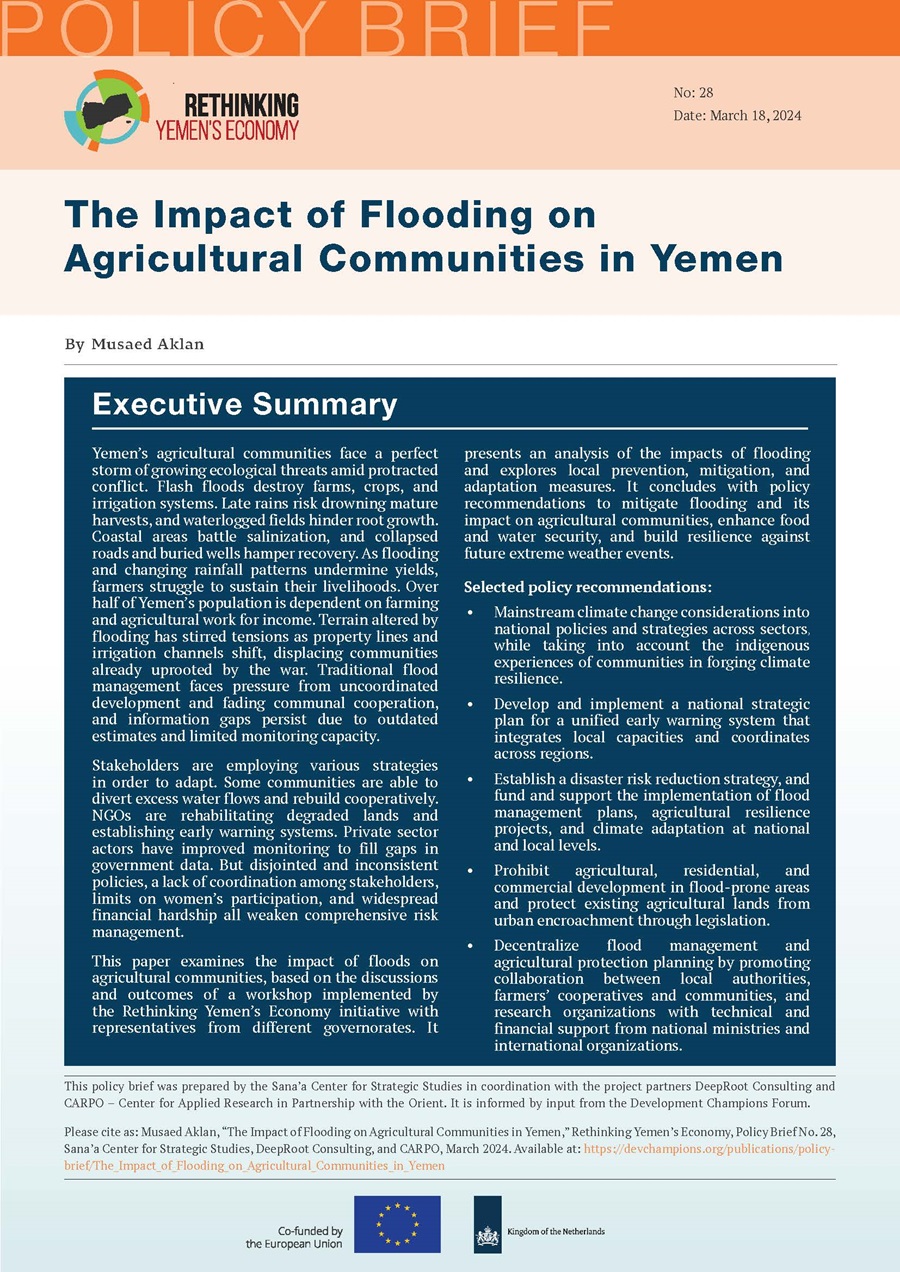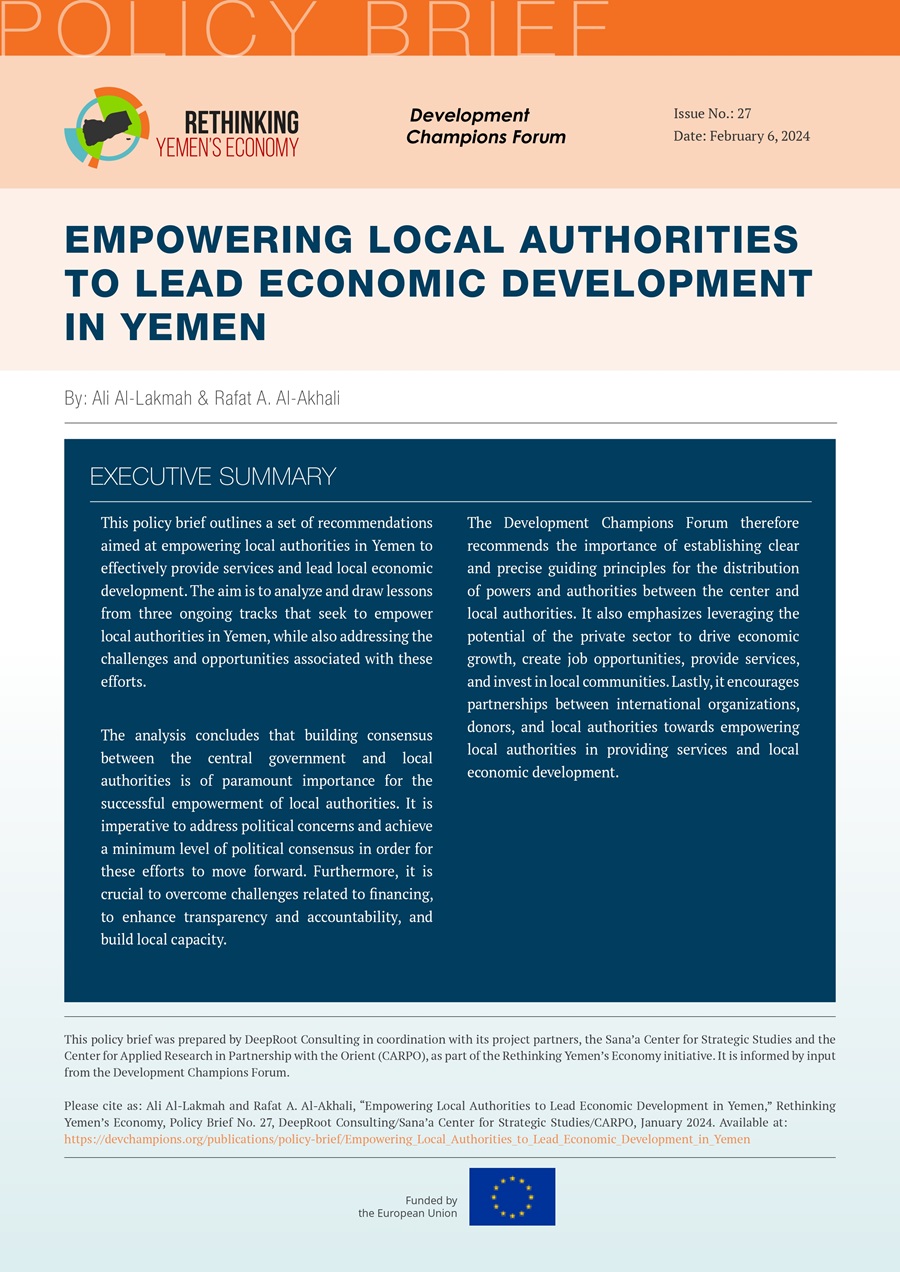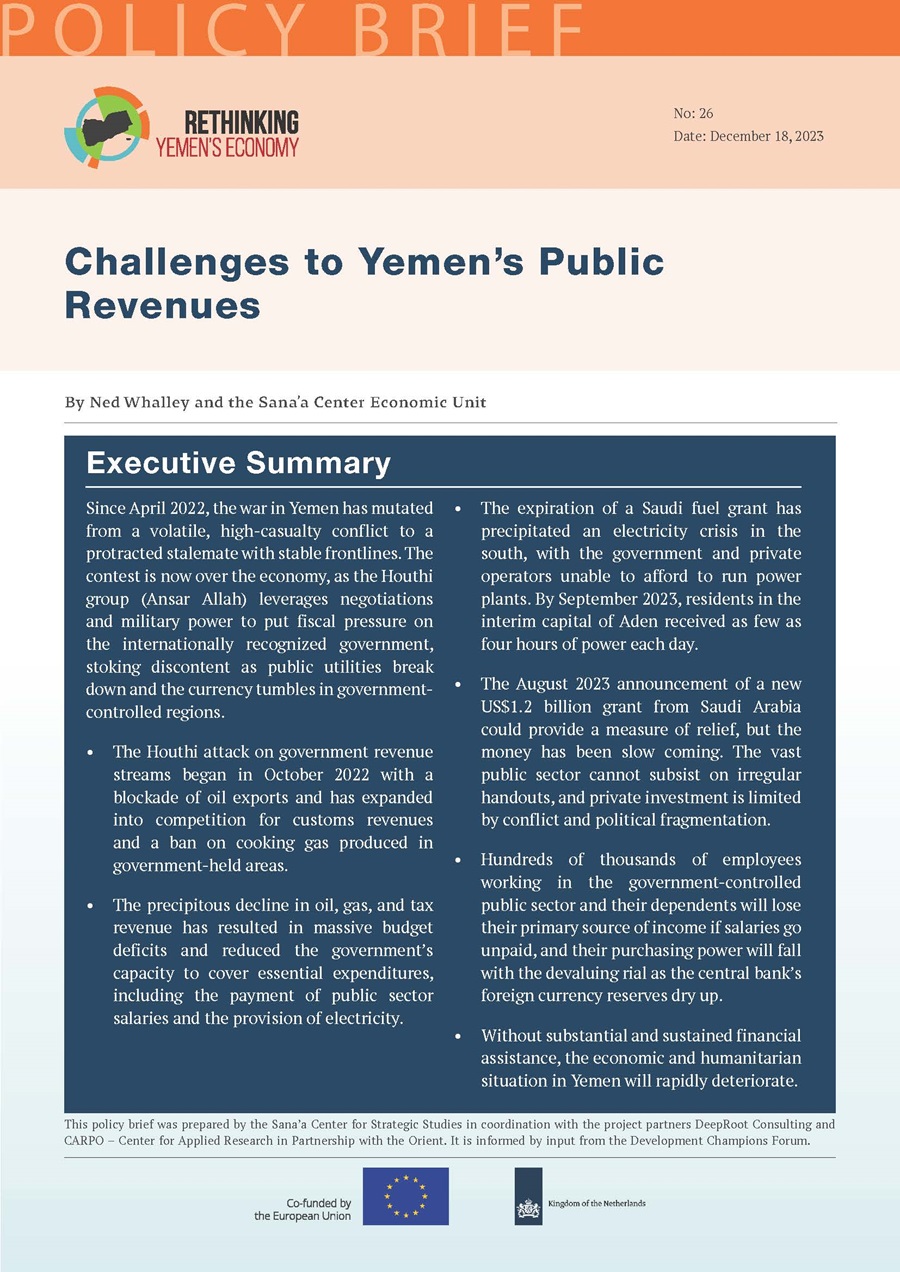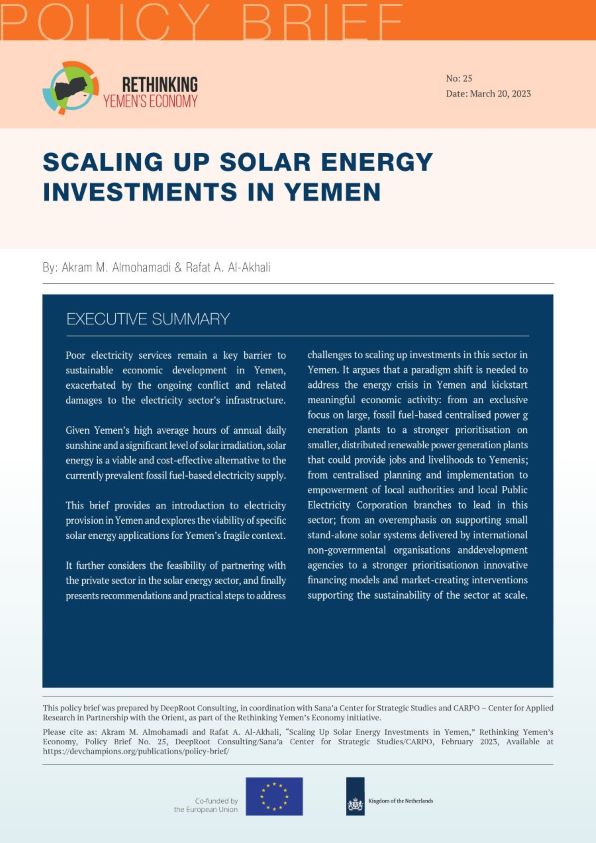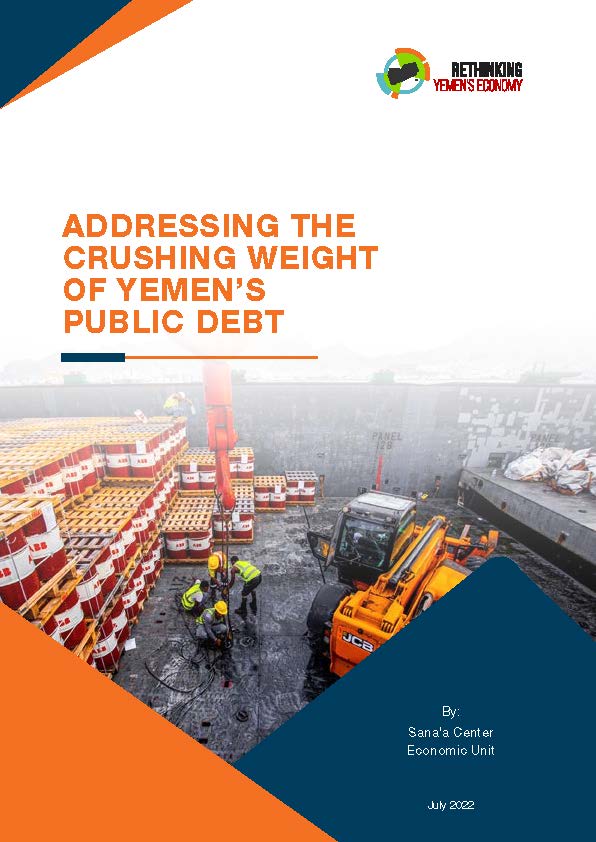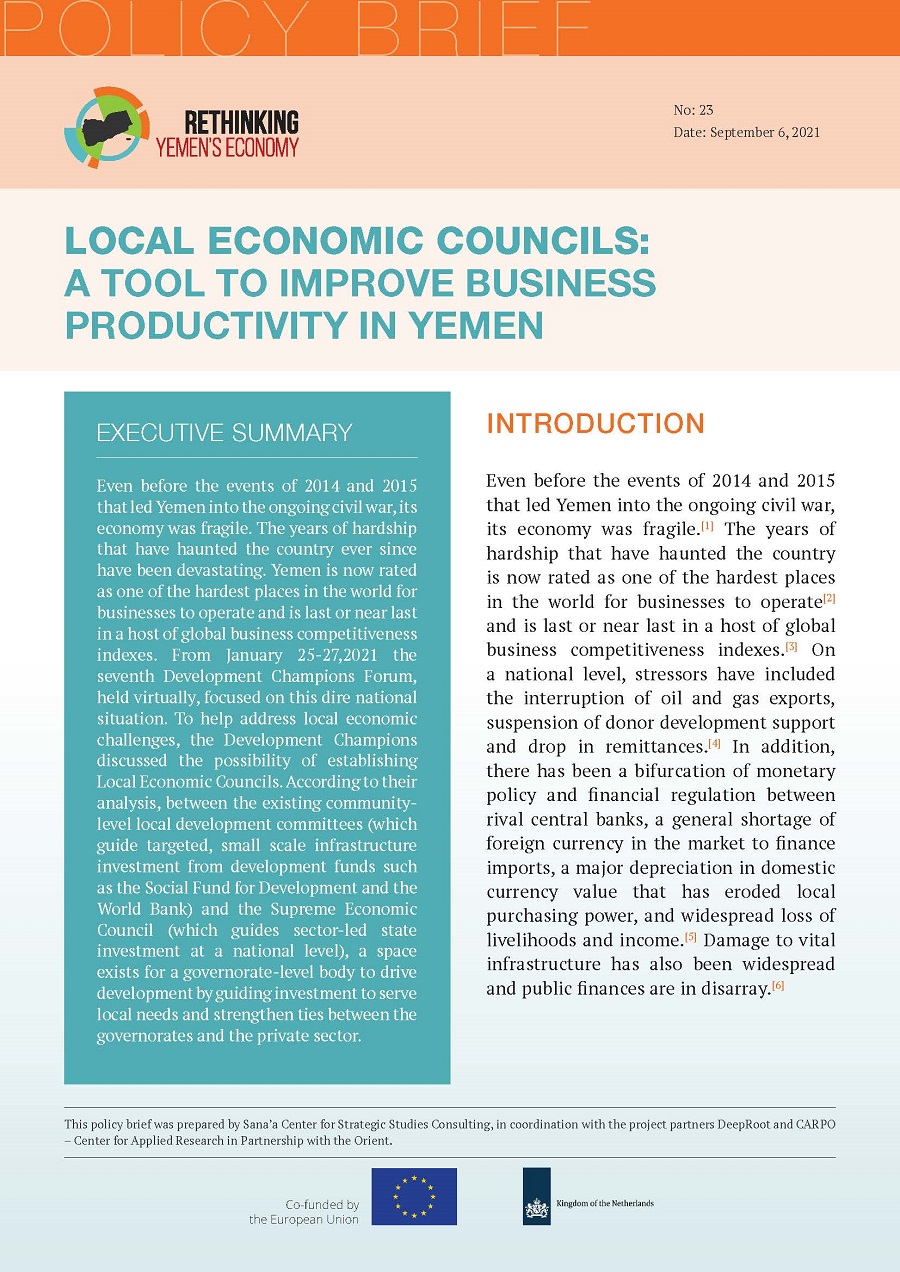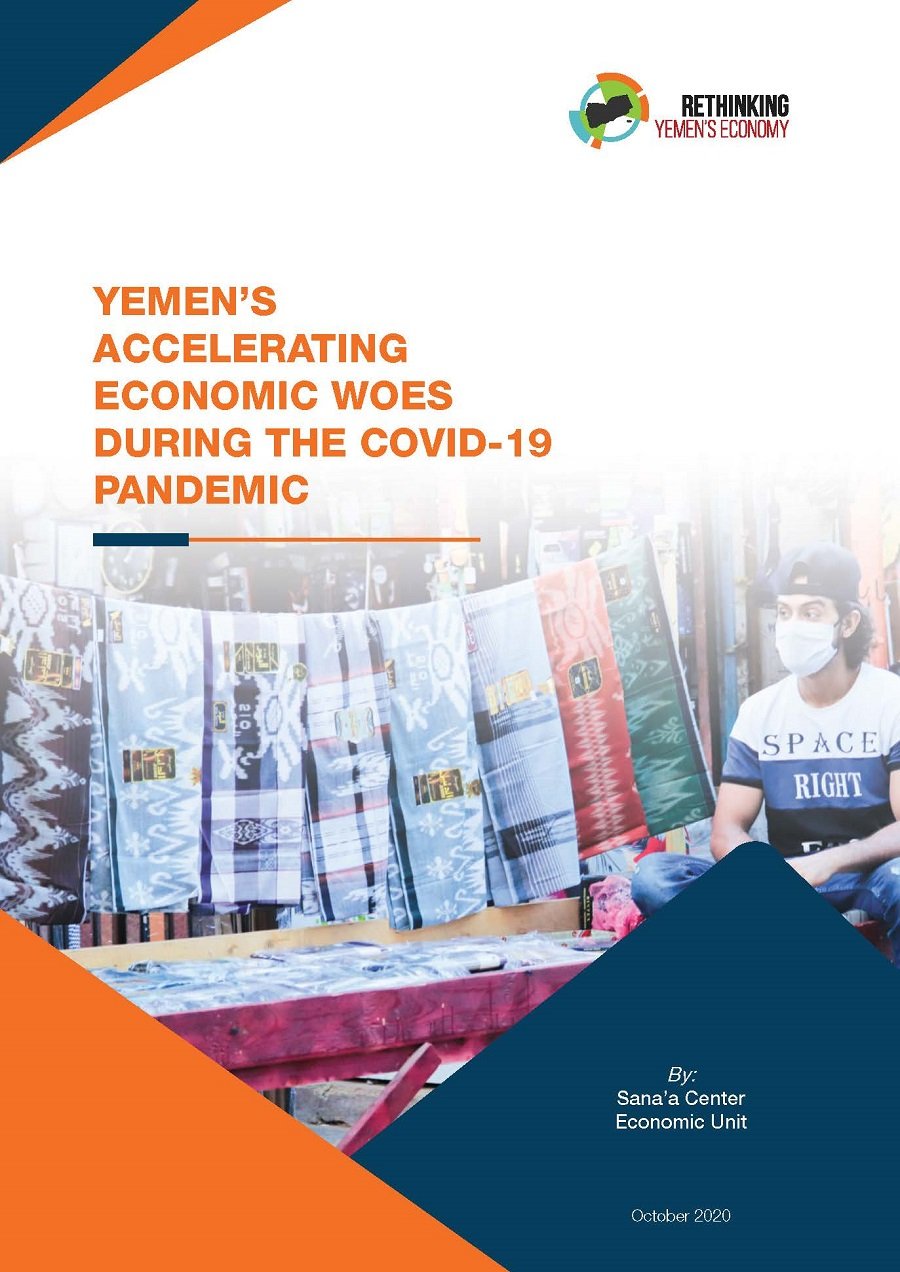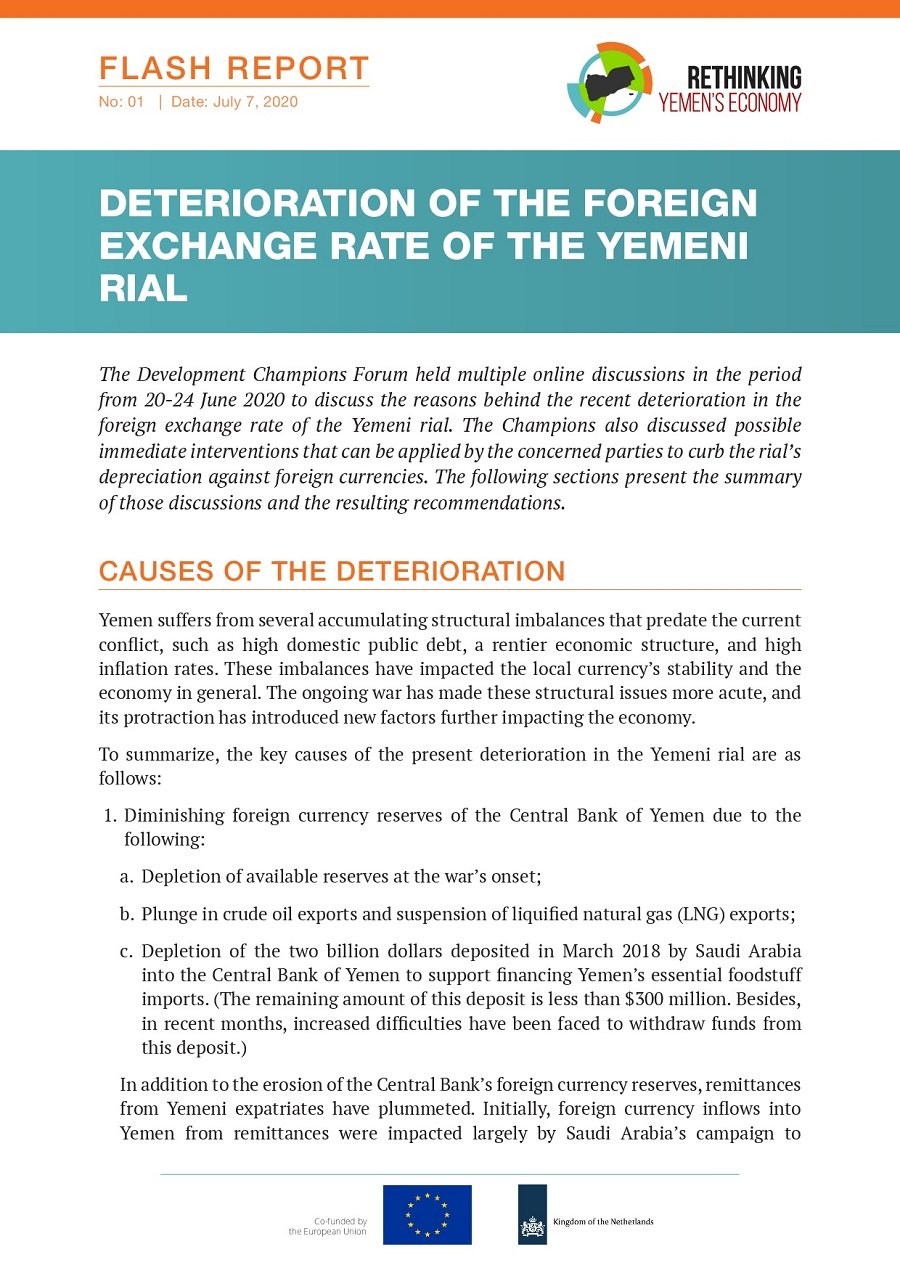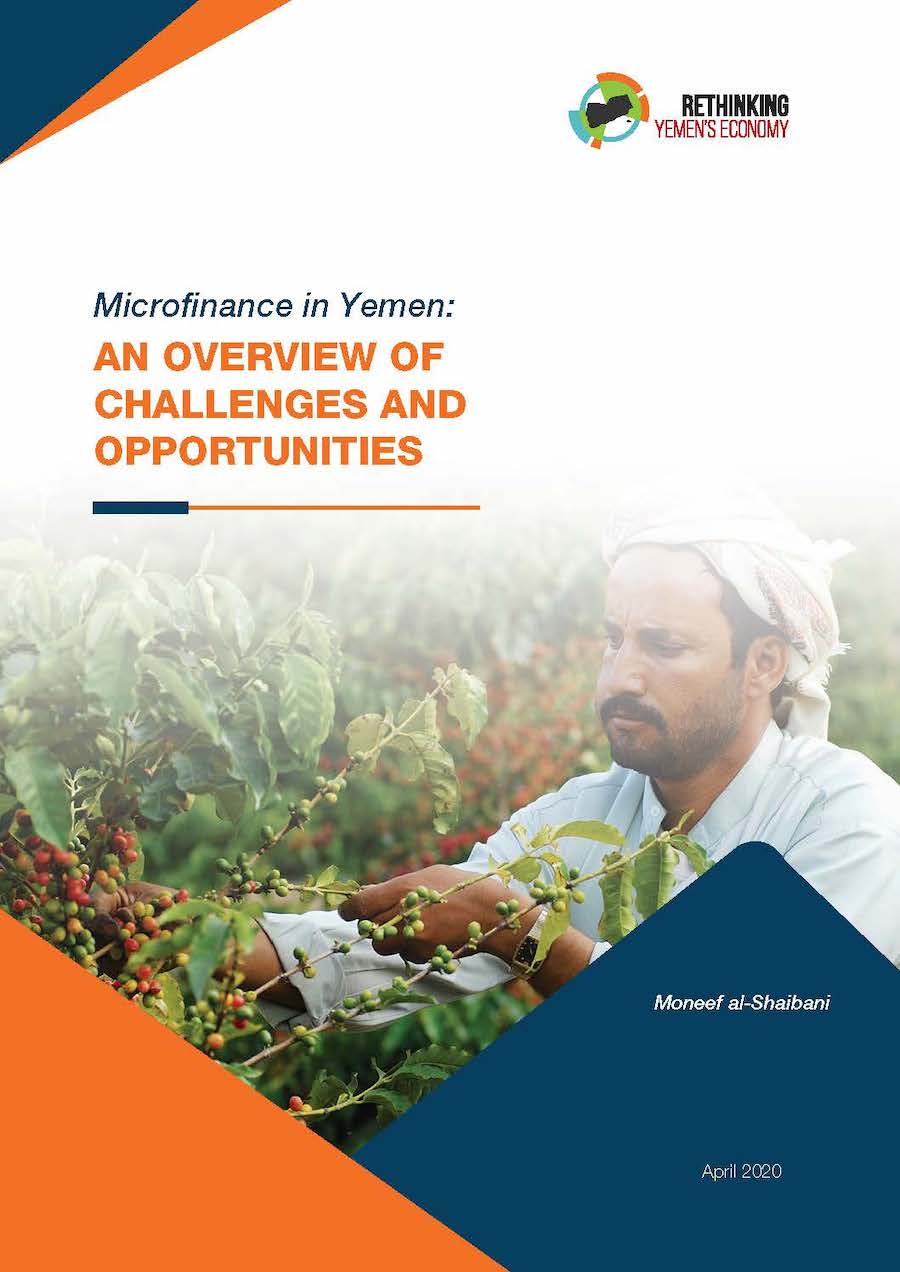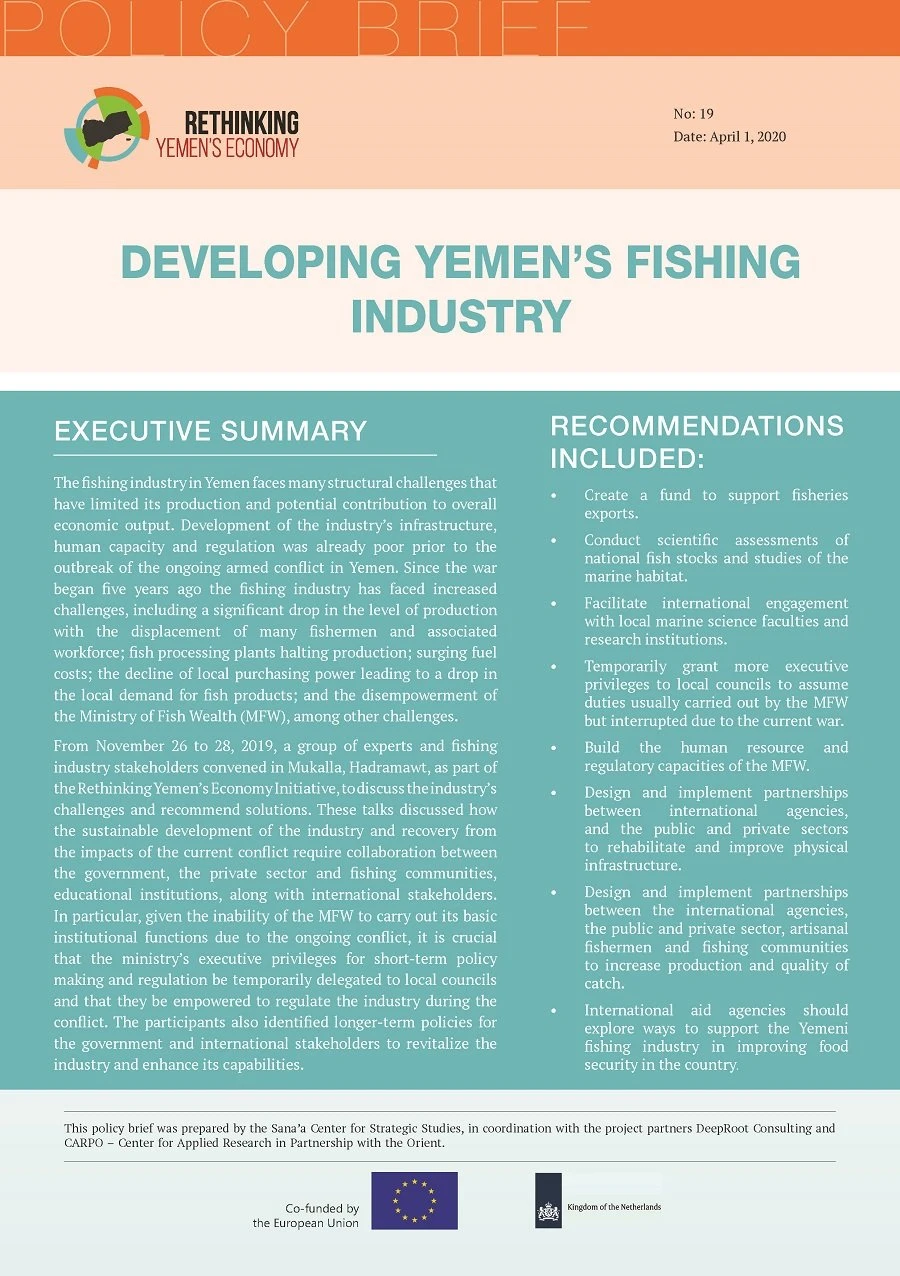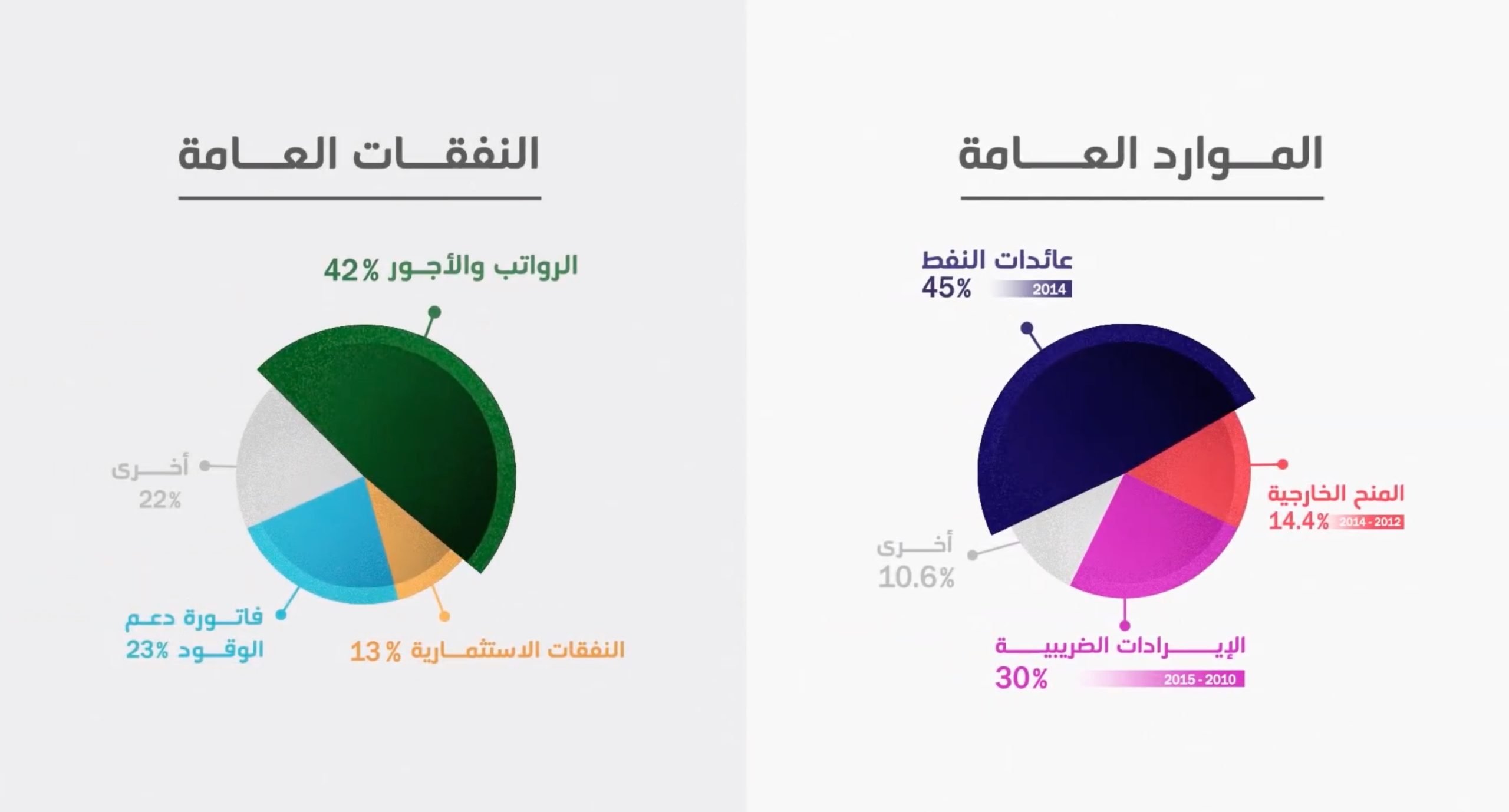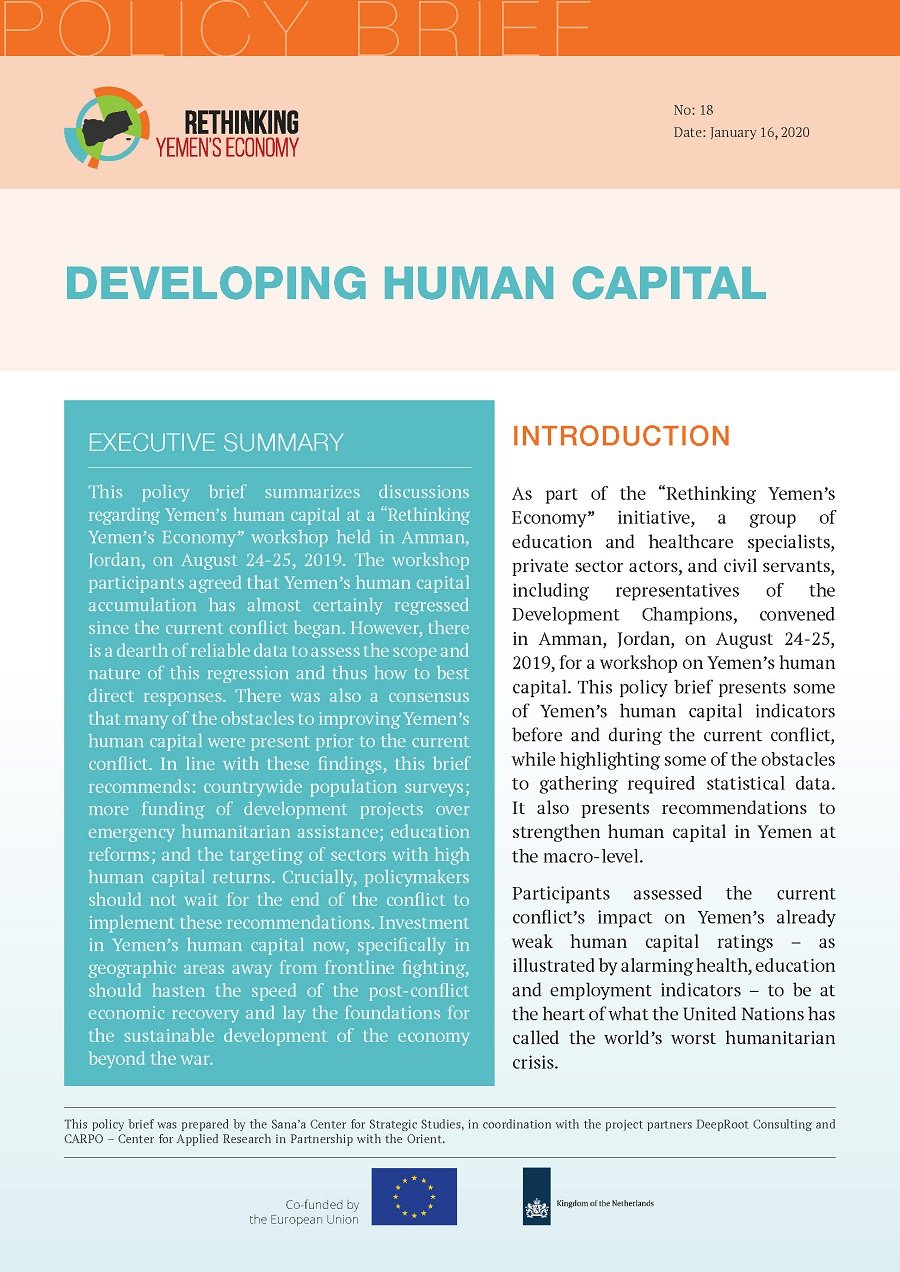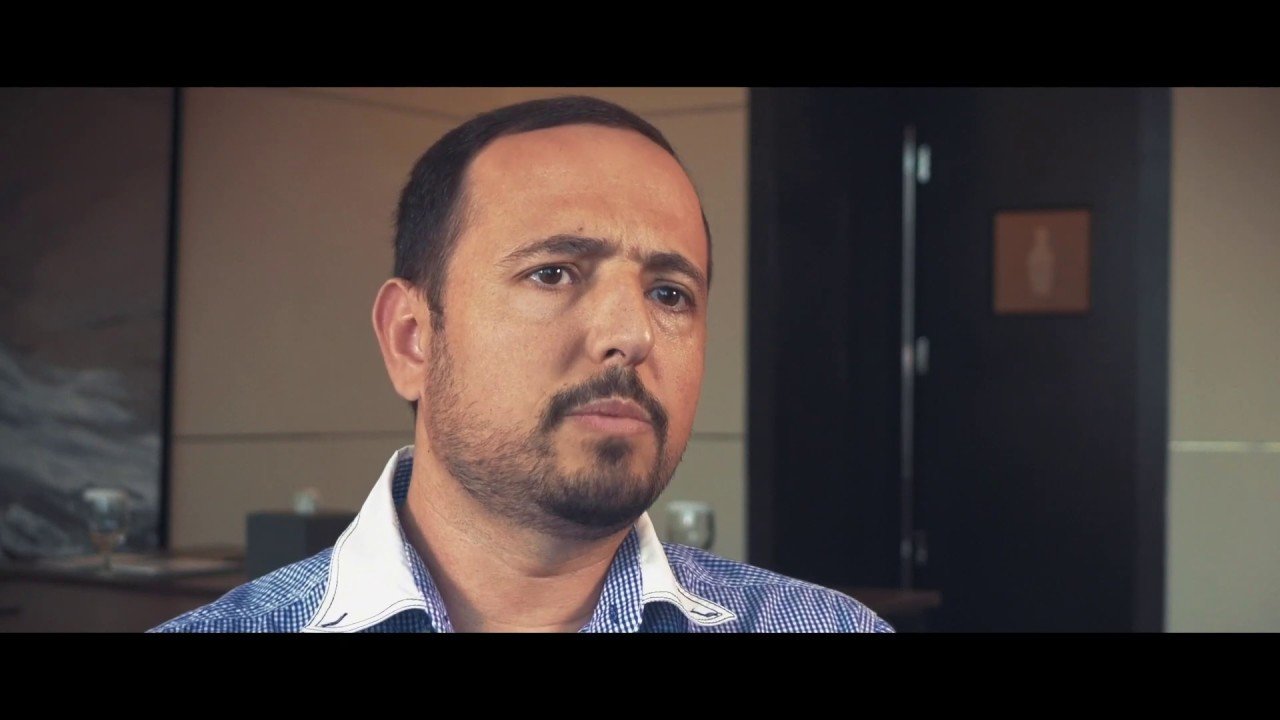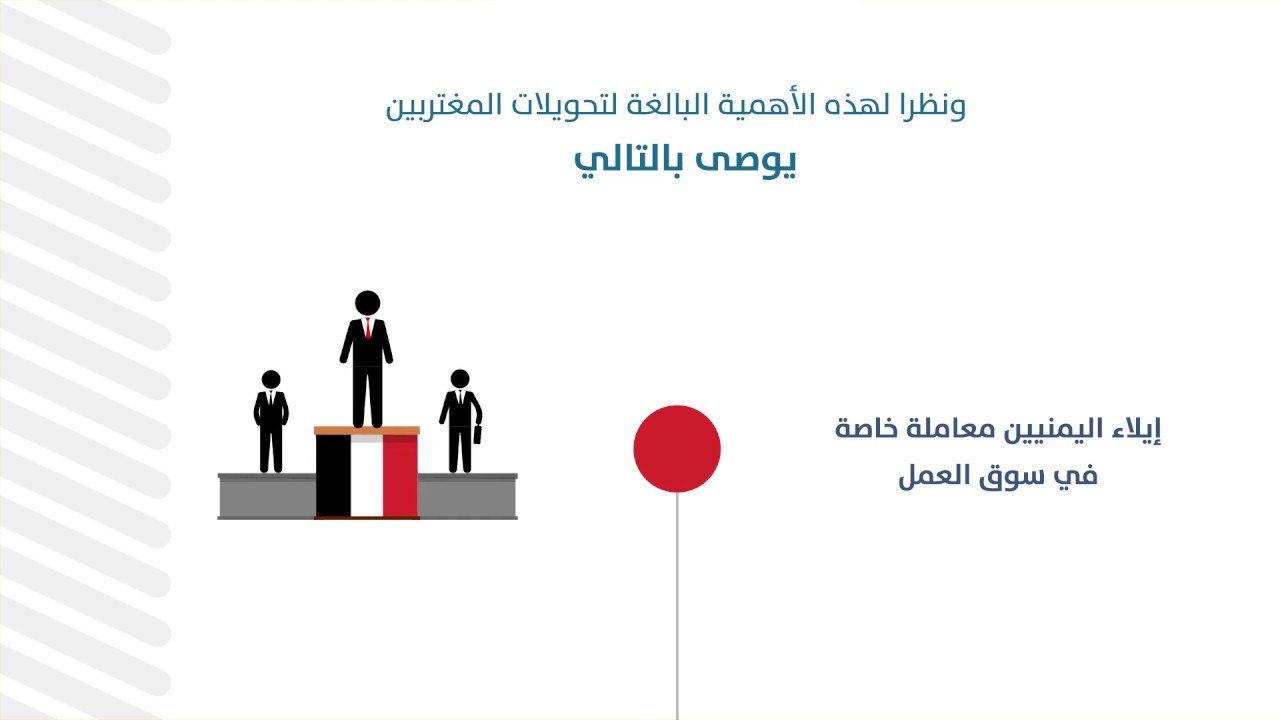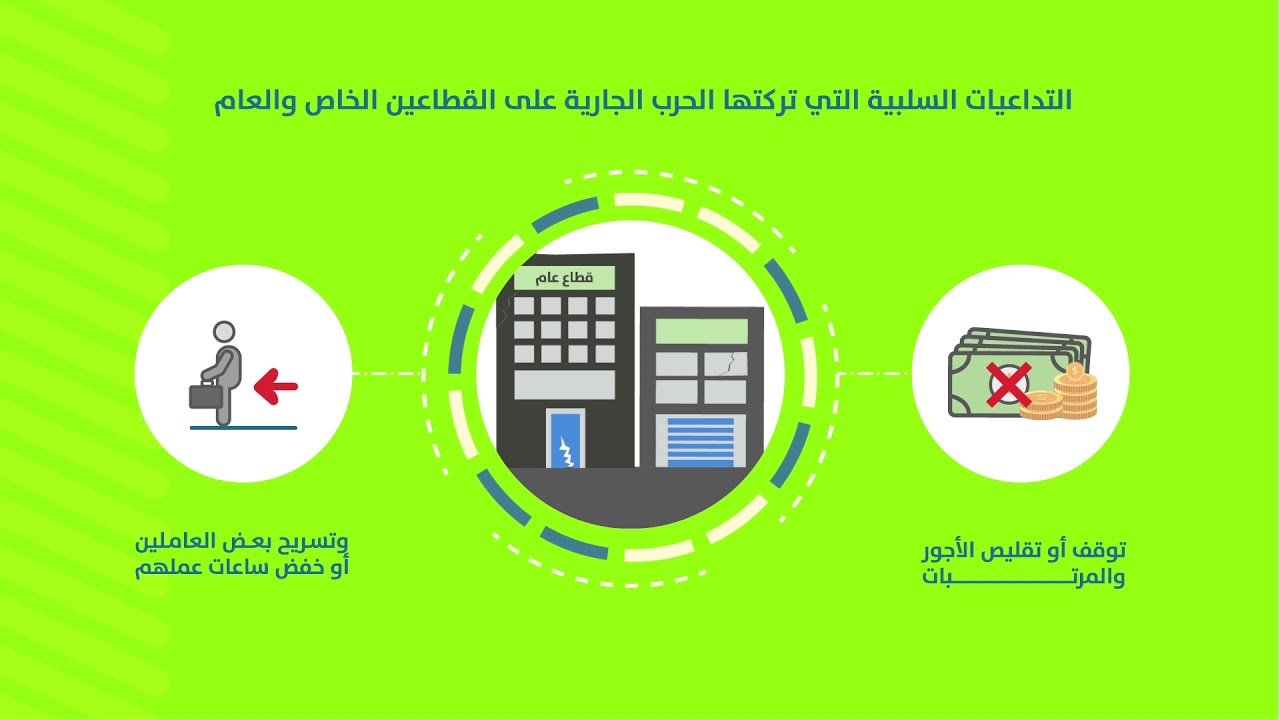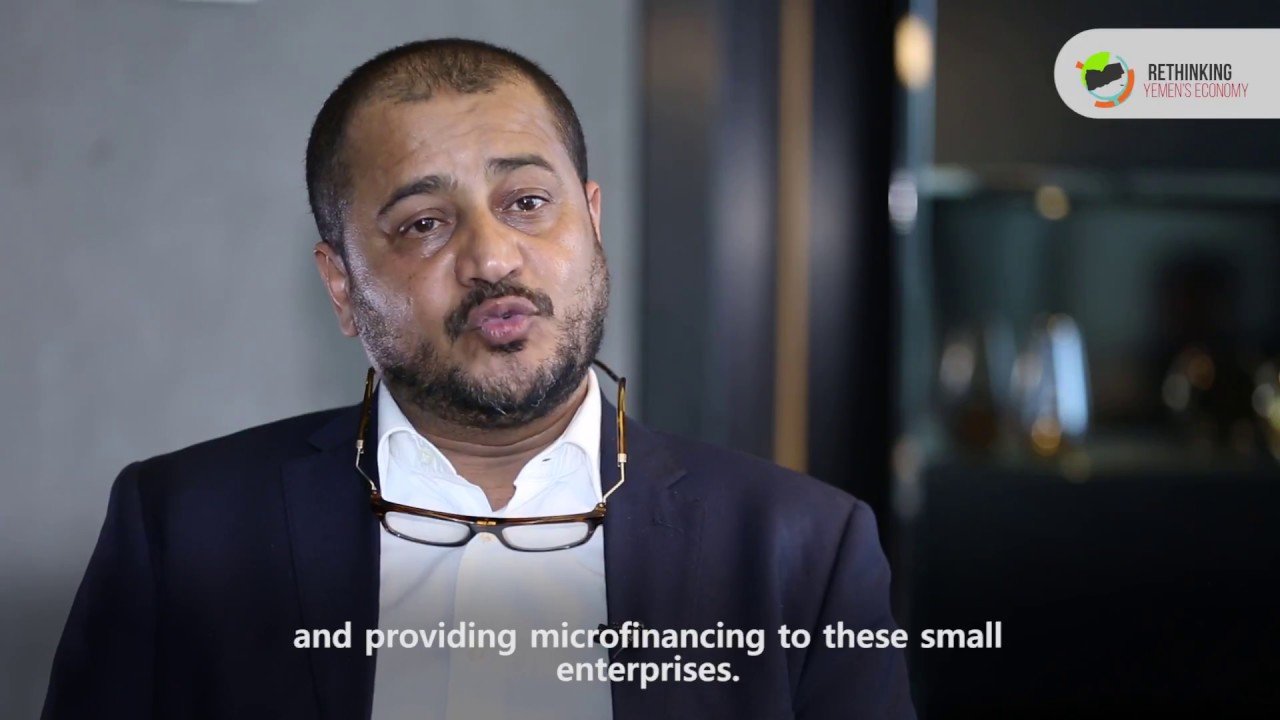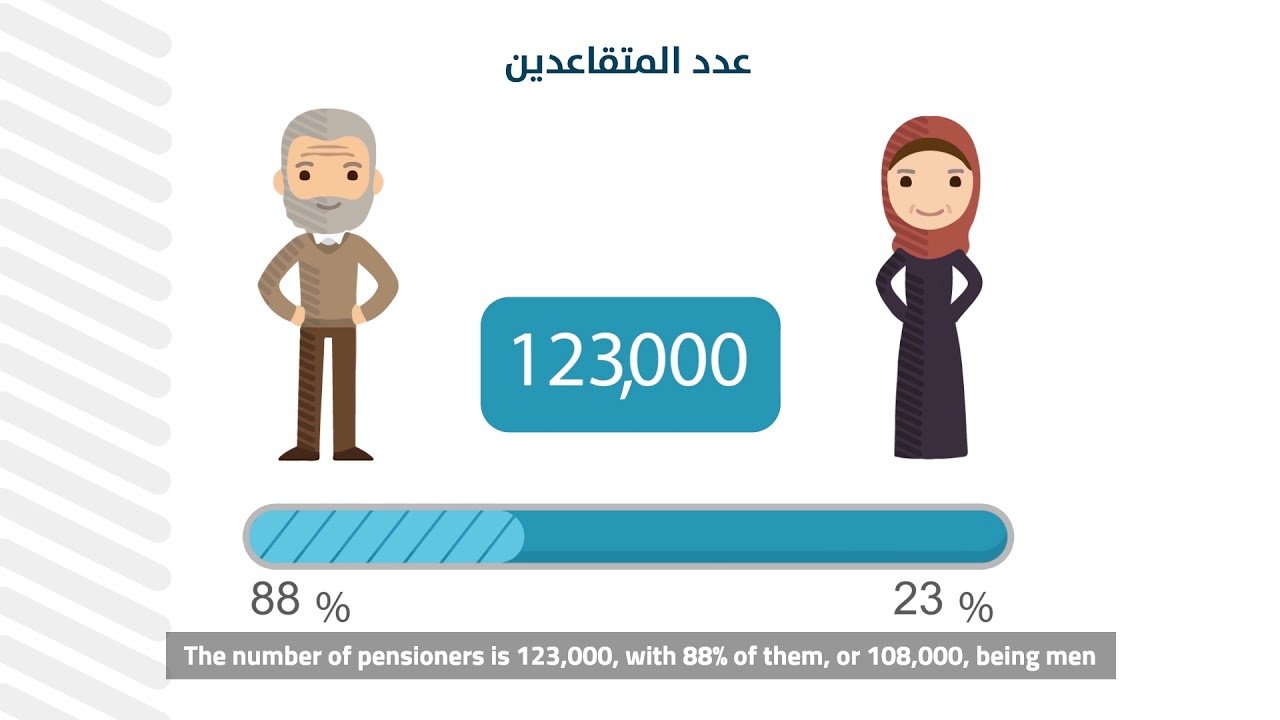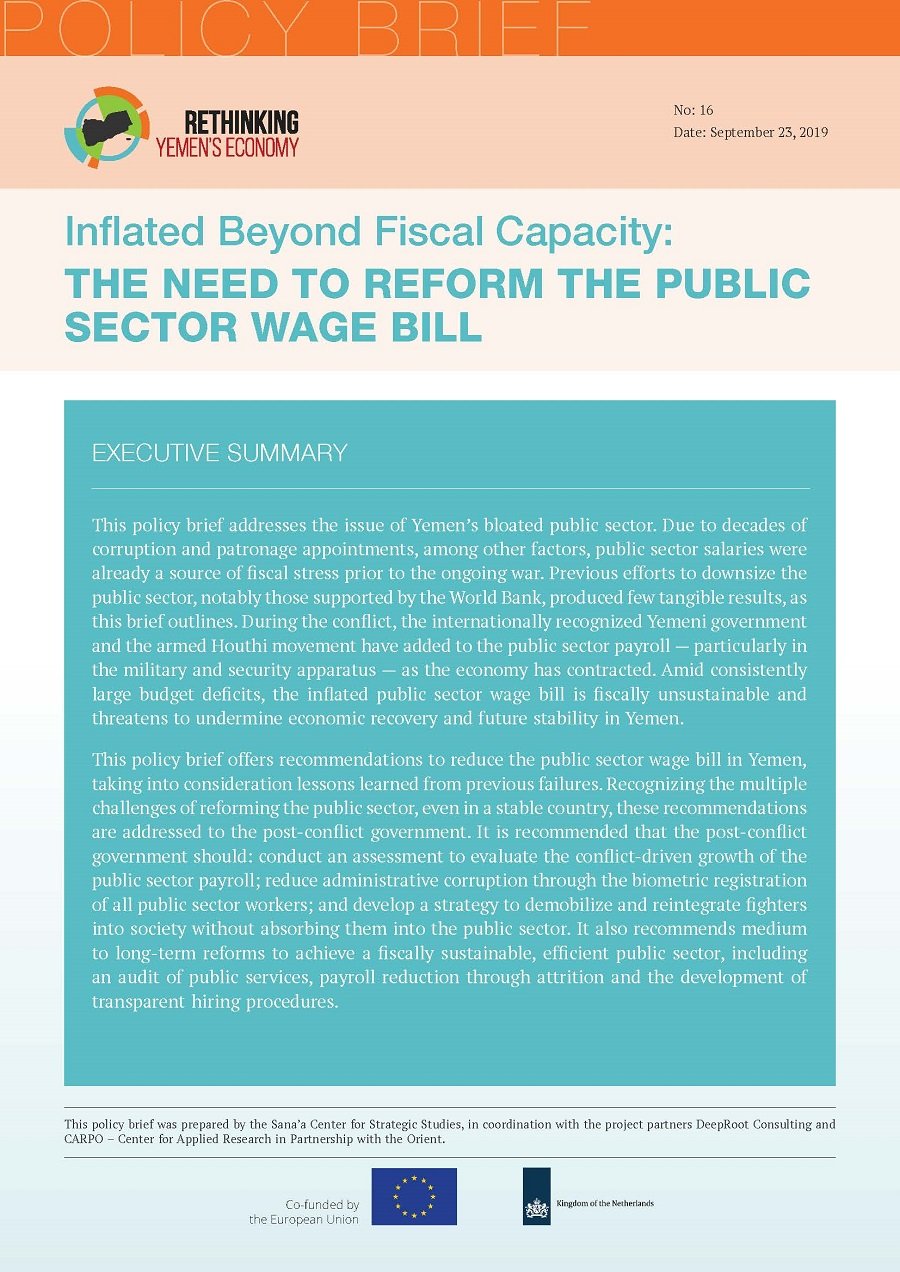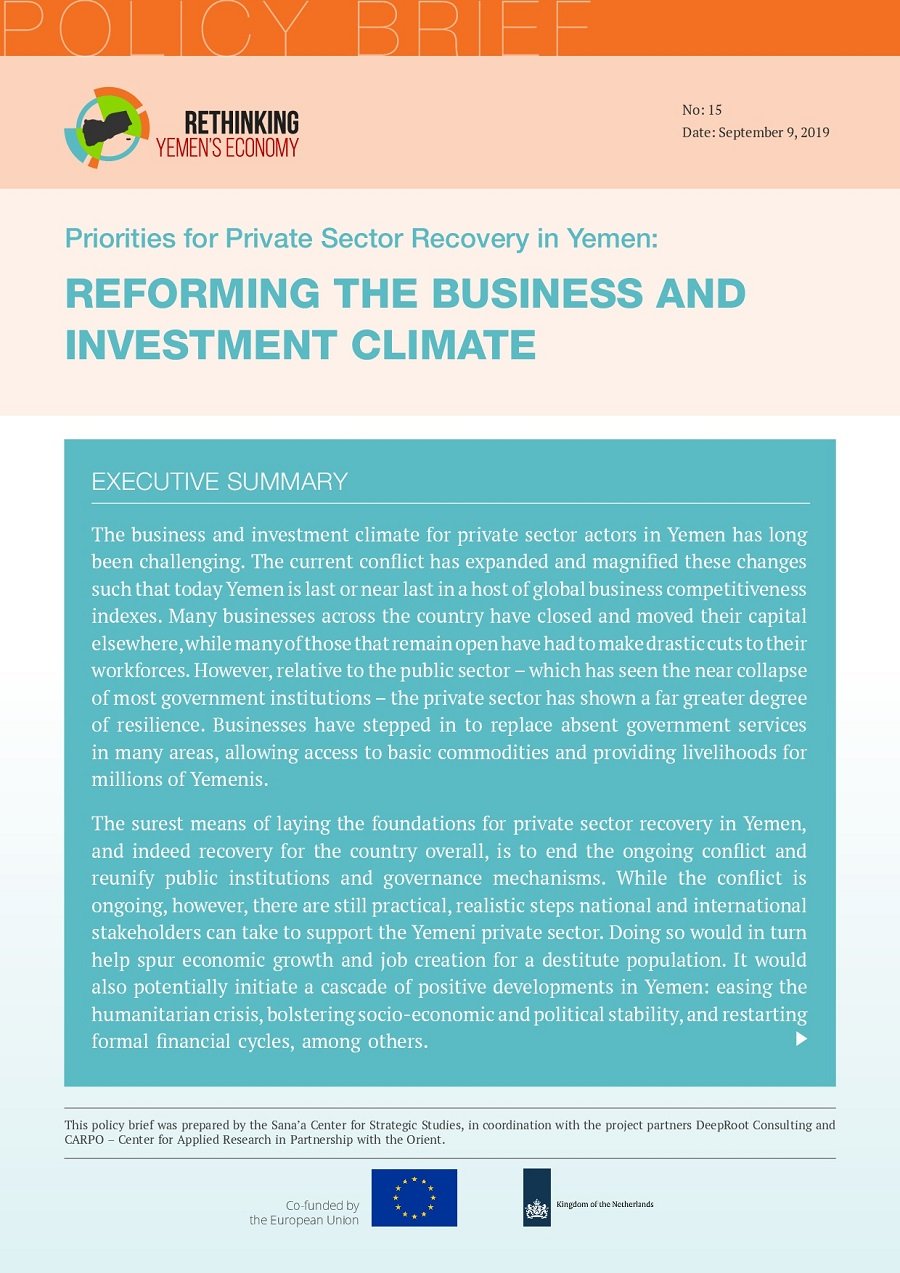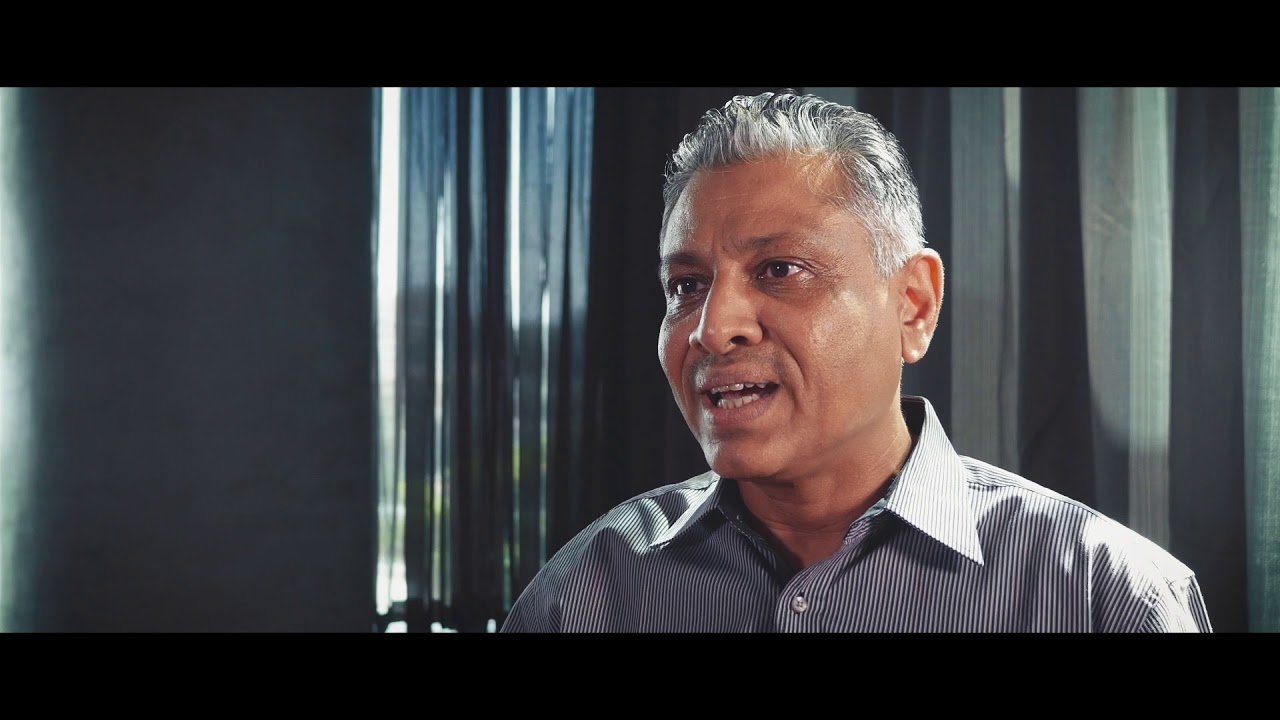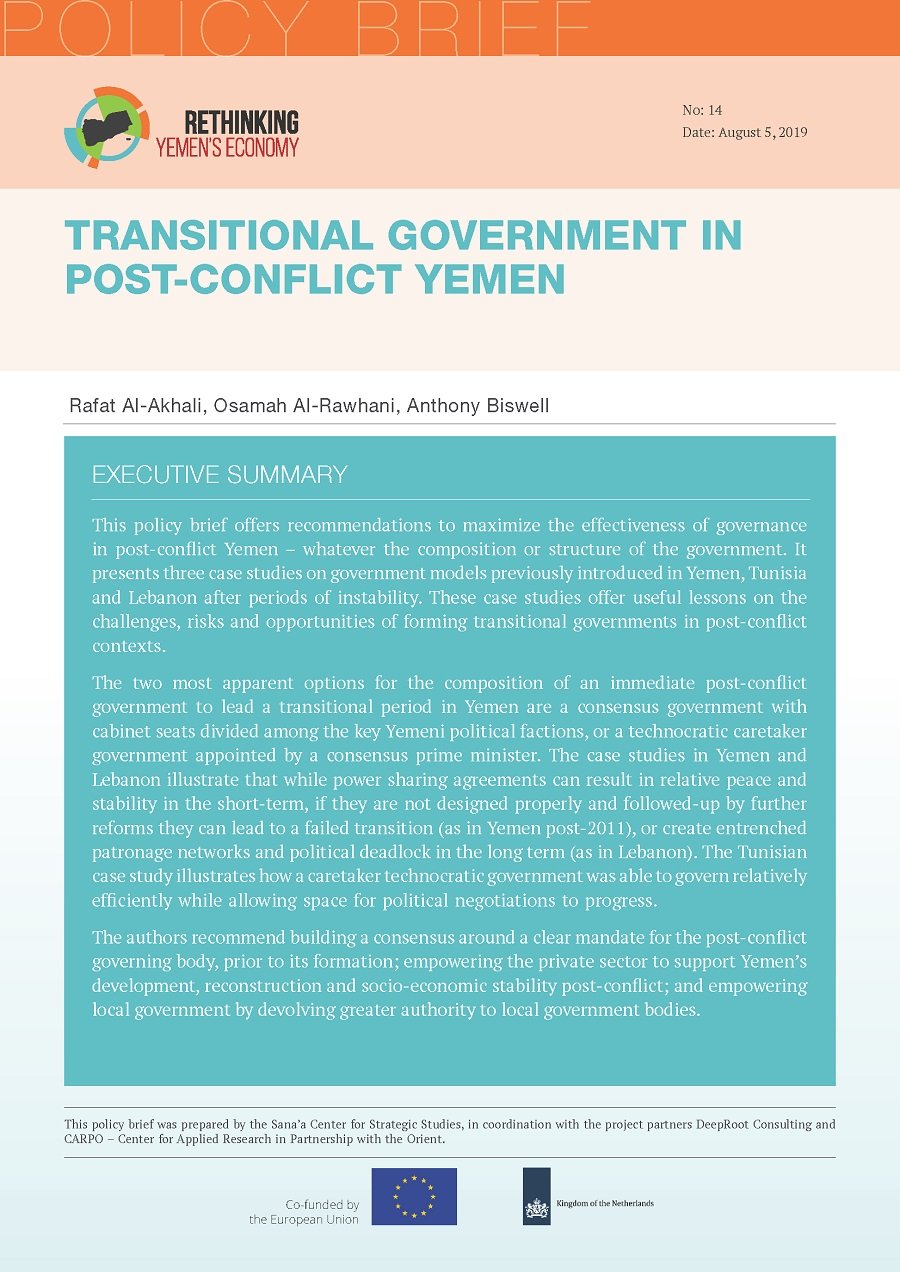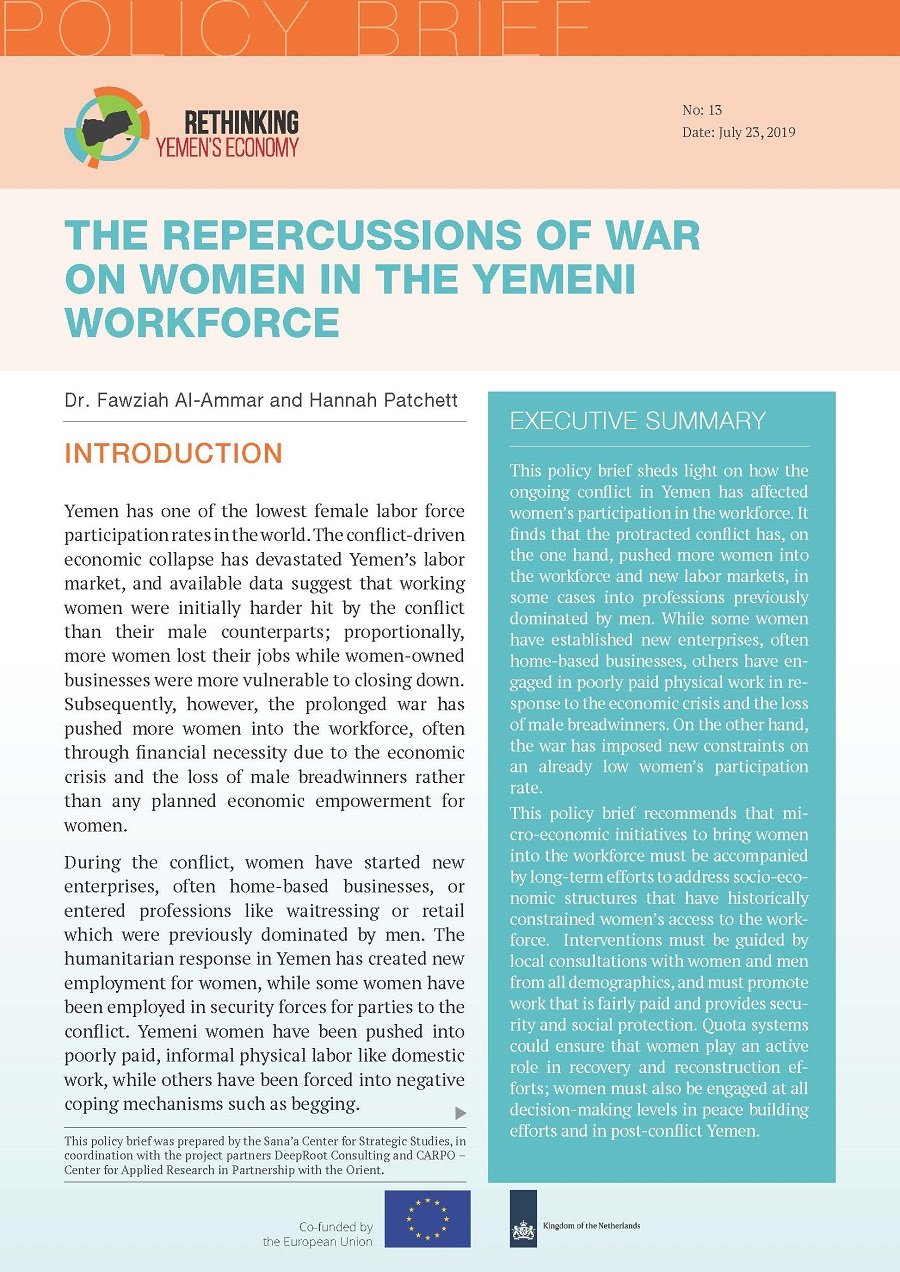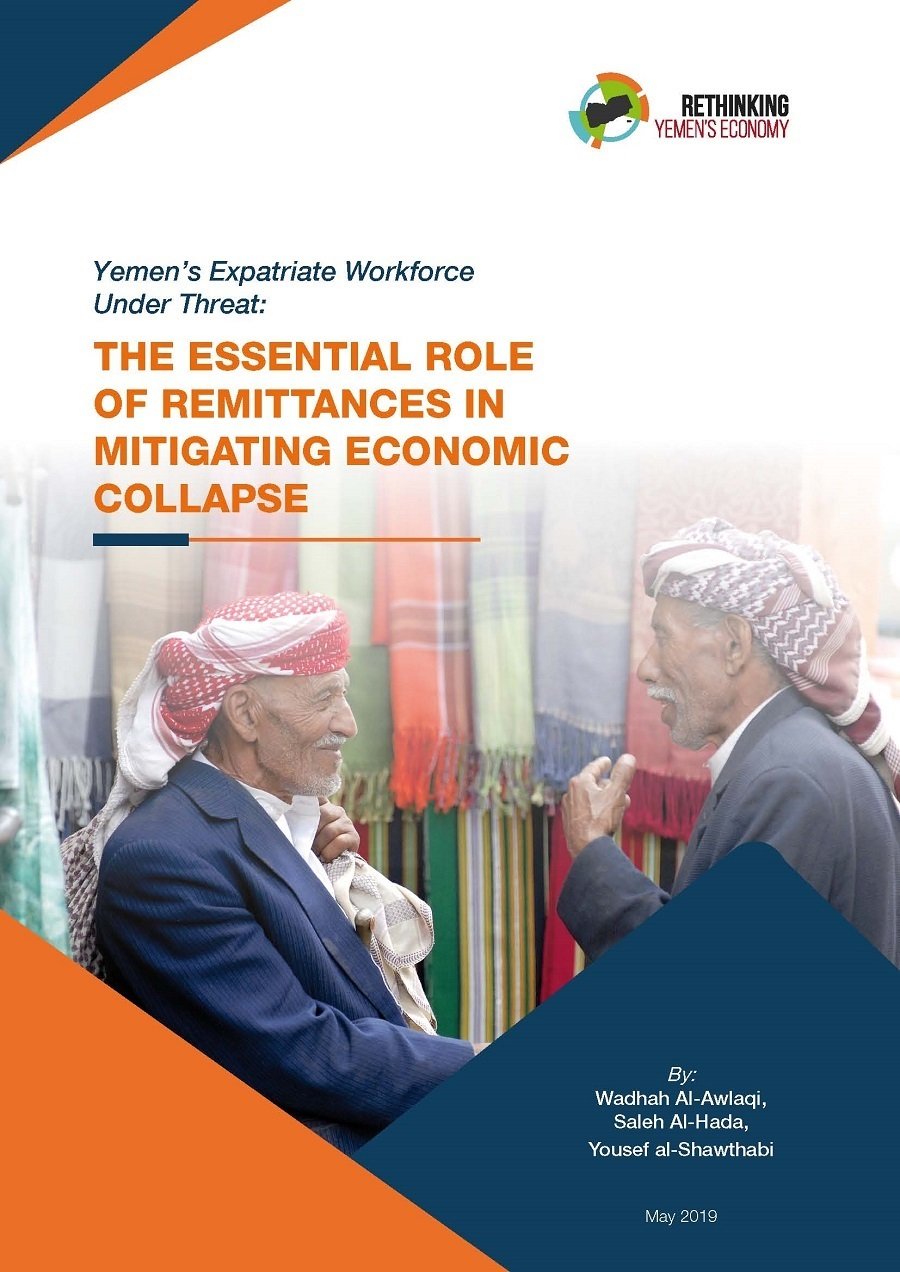Yemen’s agricultural communities face a perfect storm of growing ecological threats amid protracted conflict. Flash floods destroy farms, crops, and irrigation systems. Late rains risk drowning mature harvests, and waterlogged fields hinder root growth. Coastal areas battle salinization, and collapsed roads and buried wells hamper recovery. As flooding and changing rainfall patterns undermine yields, farmers […]
Read more...Category: Rethinking Yemen’s Economy
Empowering Local Authorities to Lead Economic Development in Yemen
This RYE Policy Brief, which is based on discussions the Development Champions Forum held in Cairo in December 2023, outlines a set of recommendations aimed at empowering local authorities in Yemen to effectively provide services and lead local economic development. The aim is to analyze and draw lessons from three ongoing tracks that seek to […]
Read more...Challenges to Yemen’s Public Revenues
Since April 2022, the war in Yemen has mutated from a high-casualty conflict to a protracted stalemate with relatively stable frontlines. The current phase has been marked by the expansion of economic warfare, with the Houthi authorities shutting down trade from internationally recognized government-controlled areas, stoking discontent as public utilities break down and the currency […]
Read more...Scaling Up Solar Energy Investments in Yemen
Poor electricity services remain a key barrier to sustainable economic development in Yemen, exacerbated by the ongoing conflict and related damages to the electricity sector’s infrastructure. Given Yemen’s high average hours of annual daily sunshine and a significant level of solar irradiation, solar energy is a viable and cost-effective alternative to the currently prevalent fossil […]
Read more...Addressing the Crushing Weight of Yemen’s Public Debt
For decades prior to the ongoing conflict, Yemen had been vulnerable to recurring budget deficits. The escalation of the ongoing conflict in 2014/15 has had a profoundly negative impact on Yemen’s debt position. Large-scale oil exports ceased, leading to a collapse in public revenues, while banks and pension funds stopped purchasing government debt instruments. Management […]
Read more...The Road Transport Sector in Yemen. Critical Issues and Priority Policies
Yemen is predominantly a rural country, with over 70% of the population living in 140,000 settlements in impoverished rural areas. Road transport is thus essential for the country’s development and overall economic growth. With only about 3,744km of paved rural roads, representing approximately 6.4% of all roads in the country, Yemen’s neglected road network poses […]
Read more...Challenges and Prospects for Electronic Money and Payment Systems in Yemen
Yemen has a heavily cash-based economy with low levels of financial inclusion. The country’s formal banking sector is highly underdeveloped, undercapitalized and concentrated in urban areas, leaving it inaccessible for most Yemenis. Plans by the Central Bank of Yemen to develop and improve electronic interbank transactions and local electronic payment systems, including mobile money services, […]
Read more...Improving Relations Between Central State Institutions and Local Authorities
Local councils are responsible for spearheading development projects and providing basic public services to Yemen’s population of more than 30 million people. The councils are particularly important in rural areas, where about 70 percent of Yemen’s population lives. In July 2018, the Rethinking Yemen’s Economy initiative published a White Paper that explored how the collapse […]
Read more...Local Economic Councils: A Tool to Improve Business Productivity in Yemen
From 25-27 January 2021, the seventh Development Champions Forum, held virtually, focused on the dire business environment in Yemen. To help address local economic challenges, the Development Champions discussed the possibility of establishing Local Economic Councils. According to their analysis, between the community-level local development committees and the Supreme Economic Council on the national level, […]
Read more...Priorities for the Recovery and Reform of the Electricity Sector in Yemen
Poor electricity services in Yemen, even before the war, have been one of the key barriers to sustainable economic development and basic service provision (e.g., water supply, health care, education). This paper assesses the power supply system status prior to the war and subsequently discusses the impact of the war on electricity sector performance, followed […]
Read more...Solar-Powered Irrigation in Yemen: Opportunities, Challenges and Policies
Yemen is one of the most water-scarce countries in the world. Its agricultural sector is the dominant user of groundwater resources, accounting for around 90 percent of total consumption. Due to the current crisis, fuel required for pumps has become scarce and very expensive; as a result, solar energy has begun to play a role […]
Read more...Impacts of the War on the Telecommunications Sector in Yemen
The telecommunications and information technology sector in Yemen is the second largest source of public revenue after the petroleum sector, and contributes important work opportunities, whether directly or indirectly, through its connections to other sectors of the national economy. Some of the most important challenges of the sector are the unsuitability of the legal and […]
Read more...Economic Priorities for a Sustainable Peace Agreement in Yemen
The Development Champions Forum stresses that the sustainability of a peace agreement in Yemen will, amongst others, depend on two critical insights: First, in a conflict that is largely over access to resources, the issues of distribution and control of those resources can make or break peace. Second, where peace agreements lack provisions that create […]
Read more...Yemen’s Accelerating Economic Woes during the COVID-19 Pandemic
Since early 2015, Yemen has been almost completely dependent on three external sources to secure foreign currency inflows and stimulate economic activity: foreign humanitarian aid, Saudi financial support to the internationally recognized government, and – by far the most significant – remittances from Yemeni expatriates, most working in Saudi Arabia. All three of these foreign […]
Read more...Microfinance in Yemen
Since its introduction to Yemen in 1997, microfinance has been viewed as a strategic tool to alleviate poverty and reduce unemployment, for it provided a means for the financial inclusion and economic empowerment of small and micro entrepreneurs by expanding financial services to them. However, persistent challenges facing the microfinance industry have stunted its development, […]
Read more...Developing Yemen’s Fishing Industry
Yemen’s fisheries sector holds untapped promise in contributing to the national economy, with a coastline of more than 2,500 kilometers and rich fishing grounds offshore. Yet the sector has long faced many structural challenges that have limited its production and potential contribution to overall economic output, which have been exacerbated during the ongoing conflict. This […]
Read more...Deterioration of the Foreign Exchange Rate of the Yemeni Rial
The Development Champions Forum held multiple online discussions in the period from 20-24 June 2020 to discuss the reasons behind the recent deterioration in the foreign exchange rate of the Yemeni rial. The Champions also discussed possible immediate interventions that can be applied by the concerned parties to curb the rial’s depreciation against foreign currencies. […]
Read more...Economic Priorities for a Sustainable Peace Agreement in Yemen
The sustainability of a peace agreement in Yemen will, amongst others, depend on two critical insights: First, in a conflict that is largely over access to resources, the issues of distribution and control of those resources can make or break peace. Second, where peace agreements lack provisions that create overall economic stability, warfare can resume […]
Read more...Microfinance in Yemen. An Overview of Challenges and Opportunities
This White Paper explores the historic development of Yemen’s microfinance industry and its players, as well as the impacts of the ongoing conflict. This analysis is followed by recommendations that address four specific areas – capacity building, financing, program design and research – to help create a more conducive operating environment for microfinance overall. The […]
Read more...Developing Human Capital
Human capital in Yemen has long been at the lowest levels across all indicators due to the successive conflicts in the country and the weak investment in human development. Over five years since the onset of the ongoing war in Yemen, human capital accumulation has continued to regress. This video emphasizes that human capital is […]
Read more...Developing Yemen’s Fishing Industry
This policy brief summarizes discussions regarding Yemen’s fishing industry at a ‘Rethinking Yemen’s Economy’ workshop held in al-Mukalla, Yemen, on November 26-28, 2019. The workshop participants, among them numerous stakeholders in the fishing industry from across Yemen, agreed that given the inability of the Ministry of Fish Wealth to carry out its basic institutional functions […]
Read more...Reforming the Business and Investment Climate
The surest means of laying the foundations for private sector recovery in Yemen, and indeed recovery for the country overall, is to end the ongoing conflict and reunify public institutions and governance mechanisms. While the conflict is ongoing, however, there are still practical, realistic steps national and international stakeholders can take to support the Yemeni […]
Read more...Restructuring Public Finances in Yemen
Even before the current conflict, Yemen’s public finances suffered from an overdependence on energy exports, one of the lowest tax collection rates in the world, and chronic budget and balance of payments deficits. The ongoing conflict has complicated an already dire situation. Energy exports have almost collapsed, while general economic and state collapse saw a […]
Read more...Developing Human Capital
This Policy Brief summarizes discussions regarding Yemen’s human capital at a ‘Rethinking Yemen’s Economy’ workshop held in Amman, Jordan, on August 24-25, 2019. The workshop participants agreed that many of the obstacles to improving Yemen’s human capital were present prior to the current conflict. This Policy Brief thus recommends: countrywide population surveys; more funding of […]
Read more...Corruption in Yemen
Corruption, or the abuse of power for private gain, has been deeply entrenched in the Yemeni political economy for decades. Over the course of the ongoing conflict, however, state capture in Yemen has become far more complex, and new patronage networks have emerged with interests that have extended across national borders and crossed the frontlines […]
Read more...Private Sector in Yemen
The impact of the conflict on Yemen’s economy and private sector have been calamitous, and, as a result, the economic output has dropped precipitously since its onset. The increased costs for businesses have been spurred by a lack of security and a scarcity of business inputs, while a loss of customer base and demand as […]
Read more...The Essential Role of Remittances in Mitigating Economic Collapse
Scarce opportunities to earn a viable livelihood in Yemen continue to drive hundreds of thousands of Yemenis abroad in search of work, especially to neighboring countries. Over time, remittances from Yemeni expatriates have become one of the most important sources of foreign currency inflows into Yemen and have played an essential role in mitigating economic […]
Read more...Generating New Employment Opportunities II: Labor Force, Labor Market and Expatriates
Decades of political instability and cyclical armed conflict have curtailed Yemen’s economic growth, job creation and labor productivity. Sharing a collective sense of urgency to address Yemen’s worsening economic and humanitarian crises, 22 of Yemen’s leading socioeconomic experts convened as part of the Rethinking Yemen’s Economy initiative to discuss job creation in Yemen and develop […]
Read more...Transitional Government in Post-Conflict Yemen
To maximize the effectiveness of governance in post-conflict Yemen, two options stand out for the composition of an immediate post-conflict government to lead a transitional period in the country. First, a consensus government with cabinet seats divided among the key Yemeni political factions. Second, a technocratic caretaker government appointed by a consensus prime minister. In […]
Read more...Restructuring Public Finances in Yemen
This Policy Brief addresses the issue of public finances in Yemen, which have long suffered from an overdependence on energy exports, one of the lowest tax collection rates in the world, and chronic budget and balance of payments deficits. With the intensification of the conflict in 2015, energy exports and foreign grants were frozen, while […]
Read more...Generating New Employment Opportunities I: Yemeni Labour Market
Decades of political instability and cyclical armed conflict have curtailed Yemen’s economic growth, job creation and labor productivity. Before the current conflict, much of the country’s working population was engaged in unskilled labor, working in rural agriculture or informally employed in small businesses. Sharing a collective sense of urgency to address Yemen’s worsening economic and […]
Read more...The Development Champions
The Development Champions are a group of senior Yemeni experts and professionals from various backgrounds and with established expertise in development and economy. The Development Champions discuss priorities for intervention by national and international policymakers, issue respective recommendations and are thus at the heart of the Rethinking Yemen’s Economy initiative. The aim of this initiative […]
Read more...The Road to Reconstruction
The ongoing conflict in Yemen has imposed grievous costs on Yemenis, damaging lives, property, and infrastructure, and collapsing the country’s already fragile economy. And yet the conflict will eventually subside. Previous reconstruction efforts in Yemen following conflict or natural disaster have suffered from lack of coordination with and unrealistic expectations from international donors, as well […]
Read more...Civil Servant Salaries
The rising wage bill for the public sector is a timebomb that threatens future economic stability in Yemen. The public sector is one of the main employers in Yemen and accounted for 32% of total government spending on average during the period from 2001 to 2014. This very heavy burden on public expenditure calls for […]
Read more...The Need to Reform the Public Sector Wage Bill
This Policy Brief addresses the issue of Yemen’s bloated public sector. Amid consistently large budget deficits, the inflated public sector wage bill is fiscally unsustainable and threatens to undermine economic recovery and future stability in Yemen. Recognizing the multiple challenges of reforming the public sector, even in a stable country, the recommendations brought forward in this […]
Read more...Priorities for Private Sector Recovery in Yemen
This Policy Brief addresses the need for private sector recovery in Yemen and gives recommendations for the improvement of the overall business and investment climate. While the private sector has shown a far greater degree of resilience than the public sector and in many cases stepped in to replace government services, its situation – and […]
Read more...Local Governance in Yemen
Local councils are among Yemen’s most important state institutions. Responsible for providing basic public services to millions of Yemenis, local councils represent official governance and the Yemeni state for vast swathes of the population. The intensification of the conflict since March 2015, however, has undermined the councils’ ability to operate effectively in most areas of […]
Read more...Transitional Government in Post-Conflict Yemen
This Policy Brief offers recommendations to maximize the effectiveness of governance in post-conflict Yemen – whatever the composition or structure of the government. It presents three case studies on government models previously introduced in Yemen, Tunisia and Lebanon after periods of instability. These case studies offer useful lessons on the challenges, risks and opportunities of […]
Read more...The Repercussions of War on Women in the Yemeni Workforce
This Policy Brief sheds light on the impact of the ongoing conflict in Yemen on women’s participation in the workforce. It finds that the protracted conflict has, on the one hand, pushed more women into the workforce and new labor markets, in some cases into professions previously dominated by men. On the other hand, the […]
Read more...The Essential Role of Remittances in Mitigating Economic Collapse
This White Paper addresses the impact of Saudi Arabia’s increasingly restrictive handling of its expatriate workforce on the economy in Yemen. The kingdom’s policies, which have forced tens of thousands of Yemenis to return home, have resulted in a dramatic loss of income from remittances for their families in Yemen at a time when the […]
Read more...
